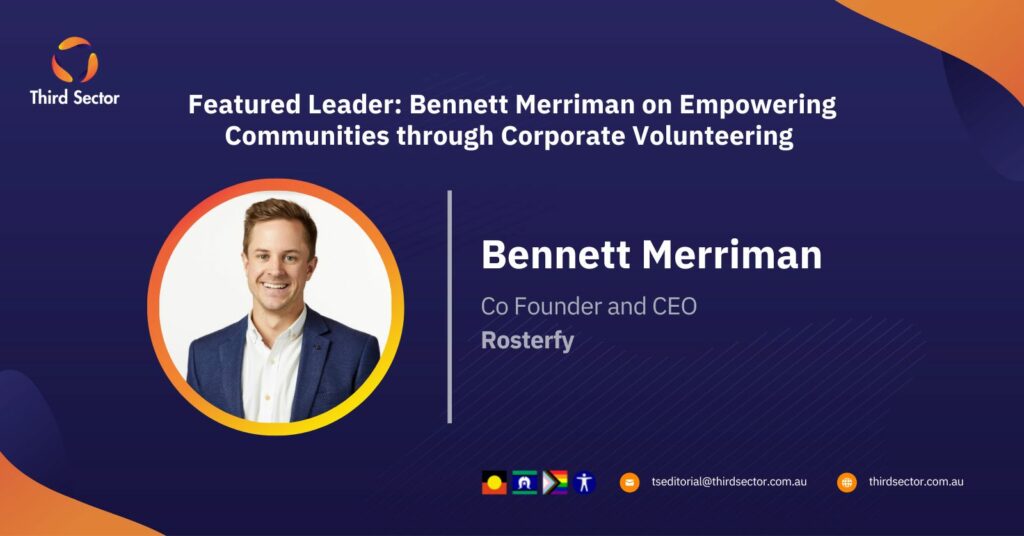Co Founder and CEO of Rosterfy, Bennett Merriman shares his insights into how not for profits can benefit from a corporate volunteer program.
Having worked alongside some of the largest nonprofit volunteer programs worldwide including Lifeline, St Vincent de Paul, Crisis and British Heart Foundation, Co Founder and CEO of Rosterfy, Bennett Merriman knows a thing or two about successful volunteer programs.
With non profit services at an all time high and recruiting volunteers becoming more and more competitive, the Third Sector sat down with Bennett to better understand how not for profits can benefit from partnering with corporates to help drive organisational success.
What is corporate volunteering and how is it different to traditional volunteering?
Corporate volunteering is a workplace program or initiative whereby companies encourage employees to give back to the community through various volunteering activities, from one-off volunteering events to long-term partnerships between businesses and nonprofits. Through these programs, employees contribute positively to society and develop new skills like leadership, self-awareness, and improved collaboration among teams.
Why is corporate volunteering something not-for-profits should consider?
Corporate volunteering helps nonprofits build capacity in their volunteering workforce. It helps to grow the audience of potential individuals who can give back. On top of this, it helps bring diverse skills to their organisation that they may not have internally.
According to Bennett, not-for-profits who often have challenges recruiting enough volunteers can help build capacity in their number of volunteers by bringing corporates and corporate groups into their workforce team.
“For corporates, typically it’s facilitated by the companies or the businesses and the employees are often encouraged, not so much mandated but encouraged to provide their time to take part in opportunities that are coordinated or at least provided to them by their employer.”
How does corporate volunteering differ from traditional volunteering?
The difference between corporate volunteering and traditional volunteering can be categorised into three main areas:
1. Organisational Structure and Support:
a. Corporate Volunteering:
i. Typically organised and facilitated by companies or businesses. Employers encourage or provide opportunities for their employees to volunteer during work hours or as part of corporate social responsibility (CSR) initiatives.
ii. The company may offer support in terms of resources, time off and sometimes even incentives.
iii. Besides contributing to social causes, corporate volunteering often serves as a team-building and employee engagement activity.
b. Traditional Volunteering: Generally organised by non-profit organisations, community groups, or individuals. Volunteers may seek out opportunities independently or through established volunteer organisations. The structure and support depend on the specific organisation or causes.
2. Time Commitment:
a. Corporate Volunteering: Often structured to accommodate the demands of the working schedule. Activities may be planned during work hours, and employees may be given paid time off or flexibility to participate in volunteer events.
b. Traditional Volunteering: Time commitment is generally more flexible and depends on the volunteer’s availability. It may include evenings, weekends, or more extended periods, depending on the nature of the volunteer work.
3. Resources and Funding:
a. Corporate Volunteering: Companies may allocate resources, both financial and logistical, to support employee volunteering initiatives. This can include funding for volunteer projects, coordinating events, and providing necessary materials.
b. Traditional Volunteering: Relies more on donations, grants, and individual efforts. Non-profit organisations often depend on external support to fund their operations and projects.
What role does technology (including systems like Rosterfy) play when it comes to corporate volunteering?
Using technology (like Rosterfy) in corporate volunteering is crucial for improving efficiency, increasing engagement, and providing data insights. Using the right technology can profoundly enhance the volunteering landscape, making it more efficient, measurable, and impactful. Volunteer management/engagement software is one of the most important digital tools in running a successful corporate volunteering program.
The top three ways technology helps corporate volunteering include:
1. Efficiency for Administrators
Internally there is a heavy workload on People and Culture and HR departments. Currently, this is spreadsheets and manual communications between parties.
2. User Experience
Focusing on engagement is key with employees. Volunteering shouldn’t be one-and-done, it should be front of mind, easily accessible and part of the top 5 most visited apps/tools.
Consolidating all opportunities centrally is also a key advantage of technology and the role it plays. The alternative is very manual.
3. Providing Data Insights
Technology can also centralise the impact your wider employee volunteers can make. Have it visible to the wider organszation and promote individuals’ efforts more broadly.
Bennett Merriman and Rosterfy are not just revolutionising volunteer management; they are providing organisations with the tools and strategies needed to thrive in an era where efficiency, collaboration and personalisation are key to success. Through their innovative solutions, they are paving the way for a brighter future for not-for-profits and their dedicated volunteers.
“We want to provide a platform where there’s diverse opportunities,” said Bennett.
If you’d like to learn more about how to make corporate volunteering a part of your overall volunteer program strategy download Rosterfy’s whitepaper, ‘How to create a successful and sustainable corporate volunteer program’ for free.
About Rosterfy
Rosterfy is used by non-profits, charities, sporting federations, and more to better manage their volunteer programs by improving how they can recruit, screen, train and retain their volunteers.
About Third Sector
Third Sector provides high-level content and services for professional development and organisational growth to leaders and senior executives from Australia’s NFP sector and its supporting industries.












